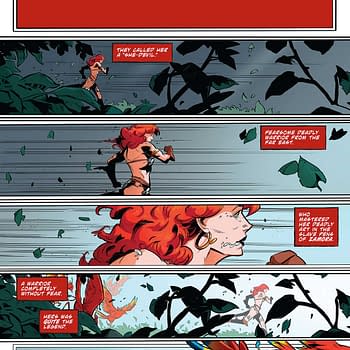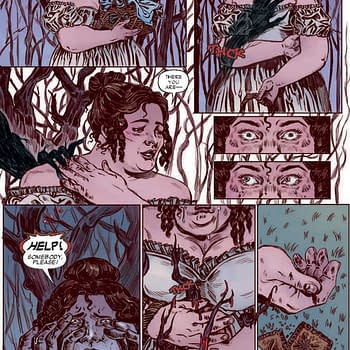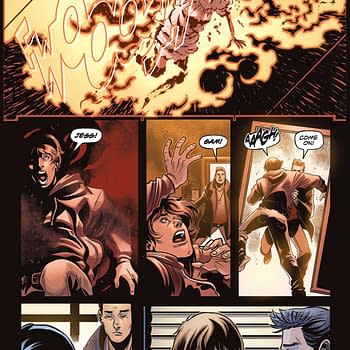Posted in: Comics, Recent Updates | Tagged: amazing spider-man, Comics, dan slott, entertainment, Marvel Comics, retconning, steve niles, superior spider-man
Retconning Progress: Requiem For The Superior Spider-Man
By Hashim Hathaway
As an avid reader of comics, I'll admit I've been slacking.
I haven't had a pull list at a comic store since 2001, and as far as I can remember, the last time I purchased an individual issue of a comic had to have been somewhere around 2009. Now that isn't to say that I haven't kept up on comics as a whole, because thanks to Wikipedia and collected back-issue paperbacks (Is that what they're called?) I've been able to keep up on pertinent storylines.
But over the past decade the only time I'd know that something major was happening in comics, is when a "death" of a character was reported in a major news outlet (which is a bit humorous, since we know death is temporary at best on the printed page). In 2012, the "death" of Peter Parker (616-version) made news, and I was curious enough to find out more. As we know, death usually serves as a pretty good marketing hook, even if only to sell specific issues.
I've had a love-hate relationship with Spider-Man over the years, much of it assigned to whoever was writing at the time. Before reading Superior Spider-Man #1, I had no earthly idea who Dan Slott was. My Spider-Man writers were guys like Bendis, Micheline, Buisek and DeFalco. So when I heard how Peter Parker was "dying", I thought it was an immediate cop-out, and I actually stayed away from those last issues of Amazing Spider-Man, as death by mind-swap didn't interest me much.
I couldn't have been more wrong.
Comics, as an industry, is often faced with the question of whether or not change is a good thing. Characters endure, certainly, because of who it is and what it is about them and their story that we love. Peter Parker has been Spider-Man since the 60's, and that isn't a mistake. However, what Dan Slott accomplished with Superior Spider-Man gave the character the new lease on life that not only made him complicated…but also interesting.
Let's face it, our heroes get stale. How can they not? They fight the same stable of villains year in and year out. The same perils exist, and every time, heroes come out on the other side victorious. I'll be the first to admit that in many ways, it's a good thing, but it isn't always the outcome, nor should it be. Fantasy shouldn't be beholden to reality, because in my mind, that is the major failing of superheroes brought to the big screen, but at the same time, you can't spin the same wheel in perpetuity. Change can be essential to bringing in new fans, from new generations.
So as excited and thrilled as I was with Superior Spider-Man, I'm equally as disappointed after reading the excellent Issue # 31, which brings the series a close with the return of the "original" Peter Parker. The final arc of Superior, "Goblin Nation" was poised to be the Octavius Spider-Man's greatest battle, but if I had to make any complaint, it became obvious that what should have, in any other situation, been the thing that solidified the reformation of the former Dr. Octopus as not only a true superhero, but also forced readers (and I admit, forced is a strong word) to accept that this was the future of Spider-Man, and as fans, we were all going to be better off for it.
But of course, that was never going to be the case, was it?
While interviewing 30 Days of Night creator Steve Niles at Washington DC's Awesome Con (stay tuned), he said something that, while being applied to another topic altogether, was pretty much the defining statement of fandom today: "Comic fans hate change." It's the fact that fandom hates change so much, especially within comics, that the genre seems to exist in this perpetual state of arrested development. Now as readers and fans in general, most of us, me included, are absolutely guilty of this. It's for this reason that Bruce Wayne is STILL Batman, despite a very good run by Dick Grayson in the underrated Batman & Robin series, wiped away by the edict of a New 52, that, while being touted as a way to reboot and refresh, only serves to maintain the status quo.
Superior Spider-Man, in 31 issues, was truly the best chance comics had to not only redefine and invigorate an existing character, but also serve as a blueprint for how change within comics can not only be a good thing, but a great thing.
But you say, "Wait, dummy…what about Miles Morales?"
I honestly believe that killing Peter Parker in the pages of Ultimate Spider-Man, and making his death real was a ballsy move by Bendis, but the fact of the matter is that the entire Ultimate world was always presented as an alternate take, and killing Parker and making Miles Morales into a new (and very good) Spider-Man is pretty much par for the course. The moves made in the Ultimate Universe only serve to show just how stagnate the 616 primary universe is. And here's where we get to the heart of my discontent: by returning the "original" Peter Parker, Slott and company have show just how little characters actually grow.
Since Amazing Fantasy 15, Peter Parker has suffered, and he has suffered. In fact, this perpetual self-immolation of Parker is referred to by Octavius in issue # 30 of Superior as the reason WHY Peter Parker is Superior to Octavius. That's not character development, that's a copout that satisfies the reasoning to undo pretty much everything that has been done over the course of the past two years (or months in comic time). Certainly it sets up new stories for Slott, as he has to navigate Parker through the wreckage Octavius inadvertently created by honestly trying to be a better hero, but I can't help but to feel as if a giant ball has been dropped, not only on THE most compelling character in all of comics right now, but robbing readers of a character in the reformed Octavius that fans had no clue they would grow to enjoy, flaws and all.
Instead, what we get is more of the same, just in slightly different situations. In the world of comics, people seem to move on much more rapidly in the face of extreme tragedy than in the real world, which could be due to the notion that calamity happens so much, but it certainly robs readers of seeing characters evolve and grow. But then, the very fact that we see characters come back from the dead so often serves as testament that maybe after all, we don't want growth or change. Sure, we'll enjoy the occasional rollercoaster ride, but as good as it was, Superior Spider-Man ends up being more of a publicity stunt than the kick in the pants that readers need in order to view their characters in a new light, with stories that only make the history that came before it that much more relevant and precious.
But then I was the hypocrite that said Johnny Storm had to stay white. Silly me.
So who knows what the future will bring for the Amazing Spider-Man. Will Otto Octavius show up somewhere else? Will he retain his reformed ways, or will Slott get an edict from management that the world needs Dr. Octopus again, and cause some tragedy, such as killing off his beloved Anna Maria (also possibly the most compelling love interest in comics history), forcing him back into tentacled villainy?
Probably. Because fanboys need their security blankets of sameness.
So farewell, Superior Spider-Man. You were bested not by insecurities of your own, but rather the insecurity of a fanbase that either didn't appreciate what it had, or an industry that believes when it comes down to it, fantasy has to be grounded to its past.
Hashim R. Hathaway is the host of the Never Daunted Radio Network, airing four nights a week at www.blogtalkradio.com/

















